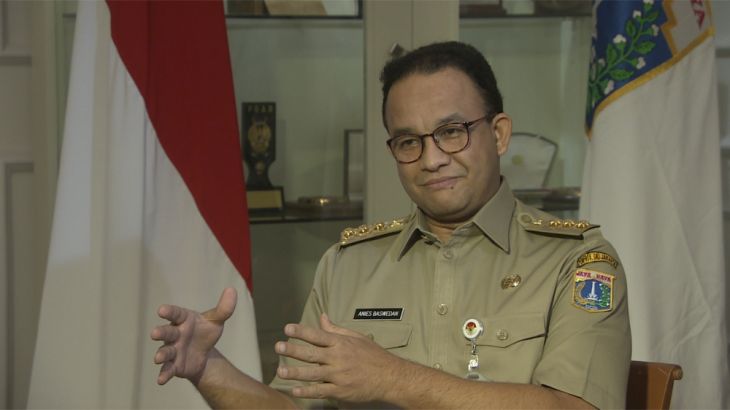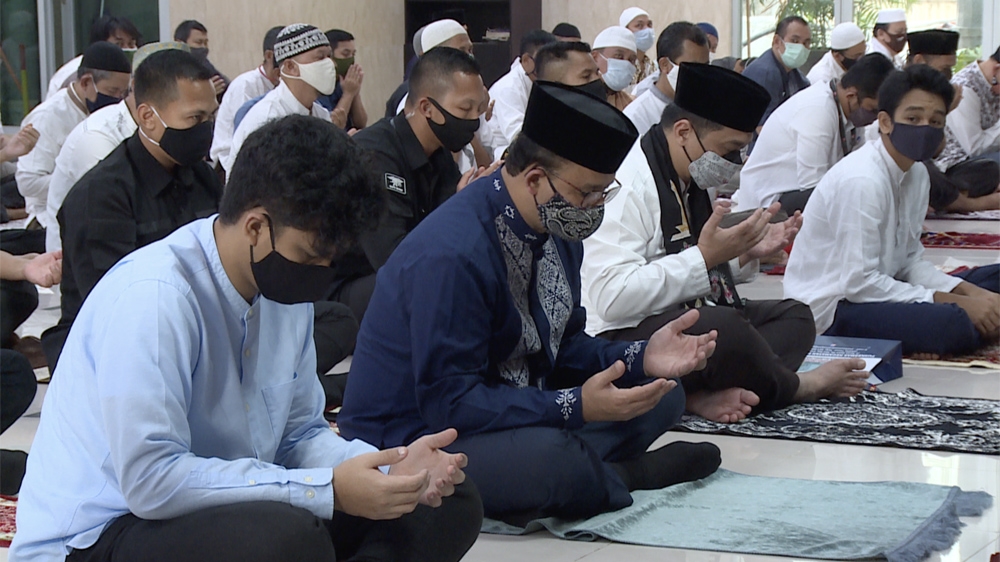Q&A: Jakarta’s governor on bringing the coronavirus under control
Anies Baswedan says he is confident the city has controlled the virus’ spread and officials are alert to the risks.

Jakarta, Indonesia – Southeast Asia’s biggest city is easing COVID-19 restrictions this week, entering what authorities call a transition period.
After weeks of partial lockdown – mosques, churches and temples will welcome worshippers, restaurants will open their doors, and workers around the capital will return to their offices – all at half capacity.
Keep reading
list of 3 itemsIndonesia protests: Burials of COVID-19 victims raise fears
Recession looms for Indonesia after slowest growth since 2001
For months, Indonesia – and in particular, its densely populated capital city – was a cause of major concern in the region.
There were fears it would become the next global epicentre of the virus. Dozens of countries advised their citizens to leave Indonesia, over fears the country’s health system would collapse under the strain of the outbreak.
And while some have expressed concern that Jakarta is easing restrictions too soon, city governor Anies Baswedan told Al Jazeera’s Jessica Washington the situation has changed dramatically, and he is confident the worst is over.
Al Jazeera: It’s been around three months since Indonesia confirmed its first case of COVID-19. How would you assess the situation here in Jakarta, and across the country?
Anies Baswedan: In the past month, COVID-19 is still an issue, but not as big as it used to be in March and April.
We started with eight hospitals dedicated for COVID patients. Today, we have 67 hospitals for handling COVID cases. Jakarta today has flattened the curve, and we are moving into a new period, which we call transition.
We are not yet able to say Jakarta is safe, healthy and productive – but we are moving into that direction.
Al Jazeera: Before we come to that transition, let’s talk about the restrictions that we have all been living under for the past few months. What were some of the challenges in imposing those restrictions?
Anies: We’re so fortunate that when we decided to close our schools, at the beginning of March, there was almost no negative response. Everyone agreed. When we called for the private sector to work from home, everyone responded positively. When we called religious leaders, and I explained to them, this is the situation, everyone responded in a positive way.

But, at the beginning of early Ramadan (the Muslim fasting month), we started to see an increase in the number of people leaving their home. It’s just people needing to be outside, to meet, and see the world – it’s natural. But it hasn’t disturbed our efforts to control the pandemic.
Al Jazeera: Obviously, it’s easy for some people to work from home – for others, daily wage earners on a low income, it’s not that simple.
Anies: That was why, when we announced the restrictions, we began providing food subsidies to families that needed support. We started to do that before the restrictions were adopted. We distributed these to 1.2 million families in Jakarta.
After two weeks, we distributed another batch. We’ll continue to provide this support until the economy is ticking again.
Al Jazeera: There was a lot of concern from other countries about how Indonesia would handle this outbreak – some countries told their citizens to leave … and go home. Are you confident it is safe for these residents to return?
Anies: They can look at our approach. We are being consistent in implementing policy, we’ve been transparent. We’re doing everything we can to make sure that Jakarta is a great home for everyone, including the international community. Let’s look at where we are – Jakarta is ready to be part of the global community.
Al Jazeera: Now we are entering this transition period, you’ve talked about an emergency brake policy – that if cases began to spike, we would have restrictions reintroduced. What would it take for you to use that brake?
Anies: We don’t want to see new cases, new patients, or new fatalities. If those numbers suddenly jump to the level that is worrying to us, we will pull that brake. The transition period should not be taken for granted; we have to work for this.
|
|
We’re monitoring it every day, and we’d like the transition to be smooth. The emergency brake is a last resort.
Al Jazeera: How concerned are you about people who left Jakarta before Eid (the celebration at the end of the fasting month), now trying to return to the city?
Anies: Very much. Last month, I introduced a law requiring entry and exit permits for Jakarta. We are trying to manage the transmissions within Jakarta, and now, we’d like to make sure there’s no mobility that disrupts the stability of the situation. We are enforcing these rules at our borders.
Al Jazeera: There was that period, before Eid, when there was confusion: People were waiting for the national government to make a decision, and ultimately, travel back to hometowns before Eid was banned. But initially, there was mixed messaging from the government. Was that frustrating for you?
Anies: My message to everyone from the beginning was, do not leave Jakarta. The reason was simple: We didn’t want COVID-19 to spread. We understand the challenges of health facilities outside the capital, and it’s a lot better here. My message was always – do not leave because if you do, you may not be able to return, as you wish.
Al Jazeera: It’s a complicated situation, though, isn’t it? The messaging from the central government wasn’t consistent. Then, we had travel restrictions brought in and watered down. Was it difficult for you, knowing that the messaging wasn’t the same across the board?
Anies: It’s a situation that we in government can be reflective and learn from this period. The public needs a consistent message. Now, we are doing much better. But we always work in close coordination with the central government, we always report our policies, and in fact, the enforcement of our rules is by the help of the national government.
Al Jazeera: But earlier on, there was a lot of criticism against the central government. What should have been done differently?
Anies: Now, from our experience in Jakarta, it’s important to be united. It doesn’t matter which party or politics.
It’s the same thing at the national level; it’s now time for us to support the policies of the president. The challenges are complex and heavy, and across Indonesia.
What’s needed: decisiveness, and clarity in message, and consistency.
Al Jazeera: There was criticism that the central government wasn’t being transparent. Is that a mistake, to not be open with the public?
Anies: I can only comment about our policies. We believe that we have to be transparent, especially on health issues. On security, strategy – that’s a different ball game. But on the issue of public health, this is a pandemic, if we didn’t tell the public, there’s no way we can control the spread of the virus.
Al Jazeera: One thing that is key to controlling the spread is testing. The new target set by the president is 20,000 tests per day. How confident are you that can be achieved?
Anies: I do hope that 20,000 a day is achievable. In March, even 1,000 seemed so high. Our labs are designed for research, not for handling a pandemic. But we transformed ourselves.
Al Jazeera: The president has talked about this idea of the “new normal”. What does that mean to you?
Anies: We would like to come back to a situation where our society feels safe, and can be productive. Social activities, cultural activities and education can all function, but there are new habits to learn.
In the early ’90s, we all drove motorcycles and never wore helmets. Then, we adopted that policy. Now, everyone does it, but it takes time. Now, wearing a face mask is something we need to become a new norm.

Al Jazeera: There was a lot of concern in Jakarta – about the death rate, about low testing, and undetected cases. Are you confident, for the most part, the city is in the clear?
Anies: Yes. We needed to make sure that they were prepared, even for the worst-case scenario. The doctors, paramedics, hospitals … if that is all ready, then I’m comfortable to start this transition period.
Al Jazeera: We know that there have been instances of over-crowding: at markets, at the airport, and more. What needs to be done to make sure that doesn’t happen?
Anies: Cases will always be there. We need to look at it from the wider perspective. We’re talking about 10 million people. The fact that six million stayed home. Some did not, and you will always see that. Law enforcement is key, tracing and testing is also key.